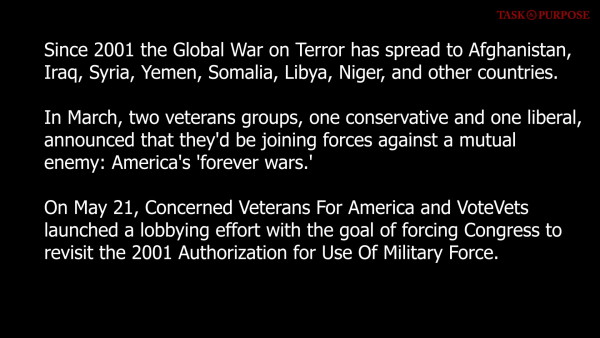

With the USS Abraham Lincoln carrier strike group and a gaggle of B-52 Stratofortress bombers flexing their muscles in the Middle East, lawmakers are mounting yet another effort to repeal the post-9/11 legislation that could be used as a potential legal justification for a military conflict with Iran.
The House Appropriations Committee on Tuesday voted along party lines to add an amendment to the annual defense budget that would roll back the 2001 Authorization for the Use of Military Force that, passed just days after the September 11th attacks, provided a legislative blank check for the U.S. military to pursue terror groups around the world.
Tuesday’s amendment was proposed by Rep. Barbara Lee’s (D-Calif.), who was the only member of the Congress to oppose the 2001 AUMF. A similar amendment, also proposed by Lee, made it out of committee in June 2017 before the Republican-controlled House removed it from the larger National Defense Authorization Act.
“In the last 18 years, it really has become increasingly clear that the AUMF has essentially provided the president, and that’s any president, the authority to wage war anywhere in the world at any time,” Lee said on Tuesday, per The Hill. “It has already been floated as a possibility for using this AUMF as the legal basis to go to war with Iran, a war, again, that Congress has not debated or authorized.”
Lee’ concerns about the AUMF and Iran are warranted. A February Washington Times “exclusive” report citing anonymous administration officials and congressional sources suggested that the 2001 AUMF — which explicitly justifies authorizes military action against “nations, organizations, or persons he determines planned, authorized, committed, or aided” in the 9/11 attacks — could justify “striking Iranian territory or proxies” given a purported alliance between al Qaeda and Tehran.
The White House appears to be making that case. “They have hosted al Qaeda, they have permitted al Qaeda to transit their country,” Secretary of State Mike Pompeo publicly stated last month. “There is no doubt there is a connection between the Islamic Republic of Iran and al Qaeda. Period, full stop.”
According to the U.S. intelligence community, however, this purported al Qaeda-Iran alliance doesn’t really exist — at least not enough to justify war under the mantle of the 2001 AUMF. Multiplereportsindicate that the senior U.S. intelligence officials who briefed Congress on the Iranian threat on Tuesday found minimal evidence that al Qaeda was actively collaborating with Tehran on the latter’s recent aggression across the Persian Gulf.
This isn’t to say that the current U.S. military build-up in the Persian Gulf isn’t based on a total delusion. As Task & Purpose previously reported, U.S Central Command chief Marine Gen. Kenneth McKenzie requested the Lincoln strike group and bomber task force because intelligence did show indications that the Iranian Revolutionary Guard and its proxies were planning some manner of direct attack against U.S. troops in the Middle East.
“We’re in a period where the threat remains high and our job is to make sure that there is no miscalculation by the Iranians,” Acting Secretary of Defense Patrick Shanahan told reporters before briefing Congress on Tuesday. “The most important thing we can do as the [Department of Defense] is avoid miscalculation and control escalation. Our posture is for deterrence.”
But for veterans of the Iraq War, the tenuous link between al Qaeda and Iran bears too close a resemblance to the run-up to that 2003 invasion. Indeed, Marine Corps veteran and 2020 presidential hopeful Seth Moulton (D-Mass.) has argued that “certain people in the administration” — namely Pompeo and White House National Security Advisor Ambassador John Bolton — are simply “pushing for regime change” in Iran.
In the 18 years since 9/11, the 2001 AUMF has justified U.S. military operations in Iraq, Afghanistan, Syria, Somalia, Yemen, Niger, and other countries. Lee’s repeal amendment, should it actually become law as part of the NDAA, will provide the most substantial brake on the ever-expanding Global War on Terror in years, even if it takes months to actually become law
In the meantime, the Trump administration may want to listen to Shanahan when he says that the U.S. military build-up in the Middle East has one simple goal: “Not to go to war with Iran.”
